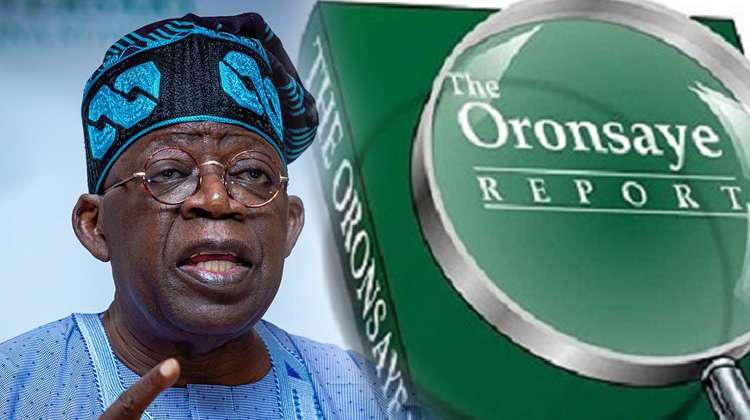Headline
FULL LIST: Agencies That May Be Scrapped Based On Oronsaye 800-page Report

President Bola Tinubu has ordered the full implementation of the Oronsaye report.
As a result, the government announced the merging, subsuming, scrapping, and relocation of several agencies.
In 2011, President Goodluck Jonathan established the Presidential Committee on Restructuring and Rationalisation of Federal Government Parastatals, Commissions, and Agencies, with Mr. Steve Oronsaye as the Chairman.
Coming from a private sector background, Oronsaye transitioned into the civil service at a senior level and ascended to the position of Head of the Civil Service of the Federation.
Submitted in 2012, the Oronsaye report highlighted the existence of 541 Federal Government parastatals, commissions, and agencies, both statutory and non-statutory.
The 800-page report recommended the reduction of statutory agencies from 263 to 161, scrapping 38 agencies, merging 52, and reverting 14 to departments in different ministries.
A previous investigation by The PUNCH found that the Nigerian government has the potential to save more than N241bn if the recommendations are put into action.
READ ALSO: 20 Insights Into Oronsaye Report As EFCC, FRSC, Others Set For Merger
Below is a list of some of the agencies that may be scrapped if the Oronsaye report is fully implemented as ordered by President Tinubu:
One of the key suggestions in the report is the consolidation of the Code of Conduct Bureau, Economic and Financial Crimes Commission, and Independent Corrupt Practices and other Related Offences Commission into a single agency.
Additionally, the report recommended the elimination of the Fiscal Responsibility Commission and the National Salaries, Income and Wages Commission, with their responsibilities being incorporated into the Revenue Mobilisation, Allocation and Fiscal Commission.
The Salaries and Wages Income Commission is likely to face a similar fate..
38 Federal Agencies were recommended for abolition, including the Public Complaints Commission, National Poverty Eradication Programme, Utilities Charges Commission, National Agency for the Control of HIV/AIDS, National Intelligence Committee, and more.
National Agency for the Control of HIV/AIDS be merged as a Department under the Centre for Disease Control in the Federal Ministry of Health.
The merger of National Emergency Management and the National Commission for Refugees, Migrants, and Internally Displaced Persons.
READ ALSO: JUST IN: Tinubu Orders Full Implementation Of Oronsanye Report
The Directorate of Technical Cooperation in Africa be abolished and its functions, along with those of the Technical Aids Corps, transferred to an appropriate Department in the Ministry of Foreign Affairs.
Infrastructure Concessionary and Regulatory Commission be subsumed in the Bureau of Public Enterprises for greater synergy and their enabling laws amended accordingly.
It was suggested that the Nigerian Airspace Management Agency, Nigerian Civil Aviation Authority, and the Nigerian Metrological Agency should be combined into a new entity called the Federal Civil Aviation Authority, with their laws adjusted to accommodate the merger.
The committee suggested merging the Nigerian Investment Promotion Council with the Nigerian Export Promotion Council to enhance resource management and utilisation.
The committee suggested repealing the enabling law of the National Commission for Nomadic Education and transferring the Commission’s activities to the Universal Basic Education Commission.
The National Council of Arts and Culture will combine with the National Theatre and the National Troupe to form a single organisation.
READ ALSO: Peter Obi Knocks Tinubu Over Arrest Of BDC Operators
The National Agency for Science and Engineering Infrastructure be merged with National Centre for Agricultural Mechanization and Project Development Institute
The committee suggested that the National Hajj Commission of Nigeria and the Nigerian Christian Pilgrims Commission be abolished, with the government focusing solely on offering consular services and vaccinations to prospective pilgrims.
The Nigerian Communications Commission, the Nigerian Broadcasting Commission and the regulatory functions of the Nigerian Postal Services were recommended by the committee to be merged.
The National Information Technology Development Agency to be fused into the Ministry of Communication Technology
Nigerian Television Authority, Federal Radio Corporation of Nigeria & Voice of Nigeria into the Federal Broadcasting Corporation of Nigeria.
The Nigerian Army University to be merged with the Nigerian Defence Academy; to function as a faculty with the the Nigerian Defence Academy.
Air Force institute of Technology also to function as faculty within Nigerian Defence Academy.
Debt Management Office to become an extra-ministerial department in the Federal Ministry of Finance Public Health Department to return to the Federal Ministry of Health
The Nigerian Investment Promotion Council was recommended to merge with the Nigerian Export Promotion Council to enhance resource management and utilisation.
One important recommendation from the committee was to stop providing government funding to professional bodies and councils. Therefore, it is necessary to revise the Professional Bodies (Special Provisions) Act of 1972, which requires the government to offer financial assistance to these organisations.
The list comprises various professional councils and boards in Nigeria, such as the Teachers Registration Council of Nigeria, Computer Professionals Council of Nigeria, Advertising Practitioners Council of Nigeria, Nigeria Press Council, Architects Registration Council, Council for Registered Engineers of Nigeria, Estate Surveyors’ Registration Board, Town Planners Council, Nigerian Builders Council, Quantity Surveyors’ Registration Board of Nigeria, and Council of Nigerian Mining Engineers and Geoscientists.
Headline
Russia, China Afraid Of US Under My Administration — Trump

United States President, Donald Trump, has said Russia and China fear the United States because of the strength of his administration, arguing that American global influence is driven primarily by its military power and leadership.
Trump, in a post on Truth Social on Wednesday stated that rival powers would not take NATO seriously without the United States, claiming the alliance lacks deterrent force in the absence of American involvement.
He expressed doubts about whether NATO members would come to the aid of the US in a real crisis, despite Washington’s continued commitment to the alliance.
READ ALSO:Trump To Withdraw US From 66 UN, International Organisations
The president credited his leadership with rebuilding the US military during his first term and sustaining its strength, describing this as the key reason adversaries show respect and caution toward the country.
He maintained that America’s military dominance has played a central role in preserving global stability and saving lives.
Trump also argued that his administration forced NATO members to increase defence spending, saying many allies had previously failed to meet financial commitments while relying heavily on the US.
READ ALSO:Insecurity: US Congressman Riley Moore Reveals Trump’s Mission In Nigeria
He added that his actions helped prevent further escalation in Eastern Europe and contributed to the resolution of multiple conflicts.
According to Trump, the United States remains the only nation that commands genuine fear and respect from both Russia and China, a position he attributed to his administration’s approach to defence, diplomacy, and global leadership.
“He wrote partly, “The only Nation that China and Russia fear and respect is the DJT REBUILT U.S.A. MAKE AMERICA GREAT AGAIN!!! President DJT.”
Headline
Trump To Withdraw US From 66 UN, International Organisations

United States President, Donald Trump, has announced plans to withdraw the US from 66 United Nations and international organisations, including key global bodies focused on climate change, peace and democracy.
The decision was disclosed in a presidential memorandum released by the White House on Wednesday evening, following a review of which “organizations, conventions, and treaties are contrary to the interests of the United States.”
According to Trump, the move will see the US end its participation in the affected organisations and cut all related funding.
A list shared by the White House showed that 35 of the organisations are non-UN bodies, including the Intergovernmental Panel on Climate Change (IPCC), the International Institute for Democracy and Electoral Assistance, and the International Union for Conservation of Nature.
READ ALSO:Trump’s Airstrikes: Halt Military Cooperation With US Immediately – Sheikh Gumi Tells Tinubu Govt
Although listed as a non-UN body by the White House, the IPCC is a United Nations organisation that brings together leading scientists to assess climate change evidence and provide periodic reports to guide political leaders.
The memorandum also announced the US withdrawal from 31 UN entities, including the UN Framework Convention on Climate Change (UNFCCC), the UN Democracy Fund, and the UN Population Fund (UNFPA), which focuses on maternal and child health.
Several of the targeted UN bodies are involved in protecting vulnerable groups during armed conflicts, including the UN Office of the Special Representative of the Secretary-General for Children and Armed Conflict.
Reacting to the announcement, UN spokesperson Stephane Dujarric said in a note to correspondents on Wednesday evening that the organisation expected to issue a response by Thursday morning.
Despite repeatedly stating his desire to limit US involvement in UN forums, Trump has continued to exert influence on international decision-making.
READ ALSO:Trump Using FBI To ‘Intimidate’ Congress, US Lawmakers Cry Out
In October last year, he threatened to impose sanctions on diplomats who formally adopted a levy on polluting shipping fuels that had already been agreed to at an earlier meeting, a move that stalled the deal for 12 months.
The Trump administration also sanctioned UN special rapporteur Francesca Albanese after she released a report detailing the role of international and US companies in Israel’s genocidal war on Gaza.
During his first term in 2017, Trump similarly threatened to cut aid to countries that supported a draft UN resolution condemning the US decision to recognise Jerusalem as Israel’s capital.
As a permanent member of the UN Security Council, the US wields significant influence at the United Nations, including veto power, which it has repeatedly used to block efforts to end Israel’s war on Gaza before later mediating a ceasefire.
(Aljazeera)
Headline
UK Supported US Mission To Seize Russian-flagged Oil Tanker – Defense Ministry

The British Ministry of Defence said on Wednesday that it provided support to the United States in its operation to seize a Russian-flagged oil tanker in the North Atlantic.
US seized the tanker, which was being shadowed by a Russian submarine on Wednesday, after pursuing it for more than two weeks across the Atlantic as part of Washington’s efforts to block Venezuelan oil exports.
According to Britain, its armed forces gave pre-planned operational support, including basing following a US request for assistance.
READ ALSO:UK Introduces Powers To Seize Phones, SIM Cards From Illegal Migrants
The UK also said a military vessel provided support for the US forces pursuing the tanker, and the Royal Air Force provided surveillance support from the air.
Defence Secretary John Healey stated that the operation targeted a vessel with a nefarious history linked to Russian and Iranian sanctions evasion networks.
“This action formed part of global efforts to crack down on sanctions busting,” he said in a statement.
READ ALSO:Venezuelan Deportees: US Embassy Gives Reason For Reducing Visa Validity For Nigerians
According to him, the US was Britain’s closest defence and security partner.
“The depth of our defence relationship with the US is an essential part of our security, and today’s seamlessly executed operation shows just how well this works in practice,” he added.
The British government said that the Bella-1 tanker, now renamed Marinera, is sanctioned by the US under its counter-Iran sanctions,
The MoD statement said the support was provided in full compliance with international law.

 News4 days ago
News4 days agoWhat I Saw After A Lady Undressed Herself — Pastor Adeboye

 Headline4 days ago
Headline4 days agoPROPHECY: Primate Ayodele Reveals Trump’s Plot Against Tinubu

 Metro4 days ago
Metro4 days agoArmed Robbers Shot PoS Operator To Death In Edo

 Business3 days ago
Business3 days agoNNPCL Reduces Fuel Price Again

 Metro3 days ago
Metro3 days agoAAU Disowns Students Over Protest

 Metro4 days ago
Metro4 days agoJoint Task Force Kills 23 Bandits Fleeing Kano After Attacks

 Politics4 days ago
Politics4 days ago2027: Rivers APC Pledges To Follow Wike’s Instructions

 Metro3 days ago
Metro3 days agoEdo: Suspected Kidnappers Kill Victim, Hold On To Elder Brother

 Metro3 days ago
Metro3 days agoNine Soldiers Feared Dead In Borno IED Explosion

 Metro4 days ago
Metro4 days agoGunmen Demand N200m Ransom For Kidnapped Brothers In Edo




























